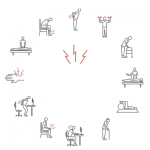Despite the numerous advances in treating rheumatic diseases over the past few decades, a major communication gap still exists in the community regarding the complexity and gravity of rheumatic diseases. The reality is that, in spite of the well-intended efforts of the ACR and the Arthritis Foundation (AF), the average lay individual still has only a limited concept of what systemic, inflammatory arthritis is all about.
Who among our citizenry believes that, on any given day in the future, he or she could suddenly wake up with a dozen or so hot, swollen joints radiating intense pain throughout the body, an inflammation which might literally continue for the rest of the individual’s life? Most healthy persons don’t realize such dramatic events even happen, much less that they have a conceivable risk for it happening to them. Instead, the wrong messages continue to permeate the public’s psyche. Virtually any day of the week, you find some reference in the media to “Avoid arthritis, take vitamins, and exercise!” How offended our patients with rheumatoid arthritis (RA) must feel when they see this deceptive advertising. It’s inconceivable that patients in this day and age should be made to feel shame or guilt for “having allowed” this devastating disease to happen to their bodies! In the popular culture of the day, RA hardly merits disease status, and is very often cast commonly as a stress-induced “condition” or a vitamin deficiency.
RA is so typically out of the mainstream consciousness that, whenever healthy persons do develop an acute inflammatory disease, their instincts lead them to believe that whatever is happening to them is far removed from “arthritis.” And typically, when given a diagnosis of rheumatoid arthritis, patients tend to be nonplussed and sometimes even irate. “No, you must not understand what I’m telling you. This isn’t rheumatism, I am in excruciating pain!” And so it goes—many times over.
Lack of Public Knowledge
Unless we plan on curing these terrible illnesses in the near future, I suggest we take a serious look at how to best inform the public and the entire healthcare establishment of the incredible seriousness of rheumatic diseases, and get as far away as possible from a trivial concept of “arthritis.” Our patients should receive the best possible care and treatment from us, certainly, but they also want and deserve, as Aretha Franklin said, “R-E-S-P-E-C-T” from their family, friends, and peers. It is we professionals, not the patients, who should be making clear to the public the severe, catastrophic nature of diseases such as RA and the toll they take on society.


